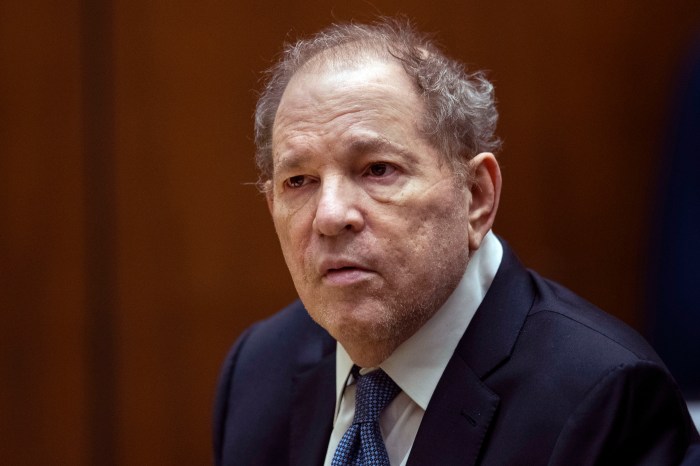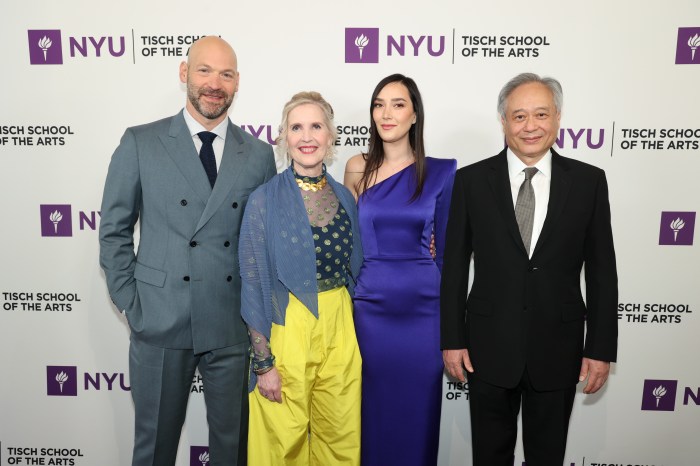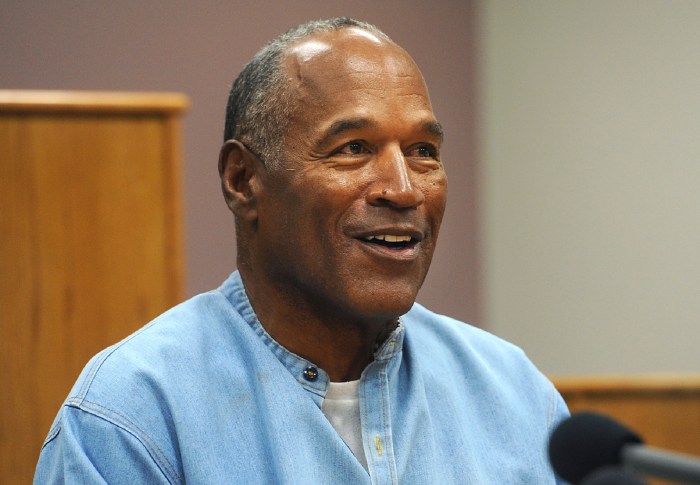Editor’s note: This article originally ran in Newsday on Jan. 19, 1998.
It’s Sunday morning at Abyssinian Baptist Church. The middle-class parishioners, many of them from Harlem’s elite, have settled into pews. The tourists from Germany and France and other corners of the world have filed inside; many more have been turned away for lack of space. The choir has sung "A Mighty Fortress Is Our God." The Rev. Calvin Butts has baptized babies, led his congregation in The Lord’s Prayer and touted the Men’s Club’s Super Bowl party.
Now Butts has another announcement. That Toni Morrison is in the house. That the winner of the Nobel Prize for literature is here and that after the service she will be reading from her new novel, "Paradise." As one, the congregants rise and shower her with applause.
Butts, a man of wit as well as inspiration, assures his listeners that everyone knows who their distinguished guest is. "If there’s anybody on Mars looking down on us," he adds, "they know who Toni Morrison is, too."
Butts asks "Sister Morrison" to come forward. "How honored I feel to be among you," she says from the pulpit. "I need and ask for your good wishes and your prayers."

Morrison, the 66-year-old writer who is black America’s best novelist and one of America’s best, knows very well how much the community means to her work. In all of her books, which include "Song of Solomon" and "Beloved," it functions like another character, the silent carrier of tradition and culture. In "Paradise," the all-black town of Ruby, Oklahoma, is in fact the novel’s main character.
Returning to the sanctuary for the afternoon’s reading, Morrison is greeted by another standing ovation. She wears a floor-length black dress. Her hair is swept back into gray dreadlocks that highlight a wide, attractive face. Of medium height and substantial girth, she carries herself with regal dignity. Her voice rings out in a strong and mellow alto, like a radio announcer’s.
If reading shows Morrison at her dignified best, answering questions from the audience reveals her sense of humor. When an aspiring writer blurts out what is on everyone’s mind — "Do you think you’re great?" — she pauses, smiles and replies with the cool assurance of someone who’s been to the mountaintop: "I thought that a long, long time ago." And the audience roars with delight.
Much longer ago, Toni Morrision was Chloe Anthony Wofford of Lorain, Ohio, a gritty steel town near Cleveland. Her parents, a welder and a homemaker, scraped together the money to send their book-loving daughter to Howard University. After graduating with a major in English in 1953, she attended Cornell University and wrote a master’s thesis on William Faulkner and Virginia Woolf. She married architect Howard Morrison, bore two sons (Ford and Slade) and later divorced.
Not until she was well into her 30s could Morrison begin to write fiction in earnest. She was a single mother who taught college English and worked as a textbook editor before embarking on a nearly 20-year career as an editor of general trade books at Random House. One of the few African-American editors in publishing, she became an advocate for such black writers as Angela Davis, Toni Cade Bambara and Wesley Brown. Her own writing was restricted to early morning and weekends.

Morrison’s first two novels, "The Bluest Eye" (1969) and "Sula" (1973), were well-regarded, but it was the next one that made her a genuine literary star. The magical realism of "Song of Solomon" transformed a Lorain-like Ohio town into a breathtaking landscape of African-American hopes and dreams. The National Book Critics Circle declared it the best work of American fiction of 1977. "Tar Baby" (1981) and "Jazz" (1992) expanded her thematic and stylistic range but lacked prizewinning impact.
"Beloved," published in 1987, is the masterwork that put Morrison on course for the Nobel. The story of a 19th century slave mother whose escape from bondage forces her to kill her own baby, the novel is an ambitious Faulknerian rendering of slavery and its aftermath. Its language is full-throated and original, its moral power immense. Reviewers scurried to find new ways to praise its excellence, sales were enormous, and the Pulitzer Prize was hers the following April.
Where "Paradise" fits into this history remains to be seen. As Morrison’s first novel since winning the Nobel in 1993, it is at any rate receiving the critics’ close attention. Newsday gave it respectful regard, The New York Times Book Review praised it, and the daily Times harshly dismissed it. Publications as disparate as The New Yorker and the online magazine Salon have acclaimed the novel as a valuable addition to contemporary literature. Tangled family histories, all the critics acknowledge, make sorting out the characters a challenge.
Just how important for Morrison are the first post-Nobel reviews of her fiction? "Well, I’d feel better if the novel were well-received," she says, noting that she often fears that her work will be misunderstood or judged too "difficult."
"I just read a review that said, ‘Hang on, reader,’ and that’s discouraging to me. A, it’s not difficult, though it may be more complicated than some books. And B, the discredit that’s done to readers. Like any other book you enjoy, you read it slowly, you relish it. It might invite subsequent reading."
Much influenced by Faulkner and other modernists, Morrison admits to preferring elliptical storytelling. "It’s more like life," she explains. "It’s less like a news narrative. The fact is, at any moment your past is sitting right there in front of you. You might be back 20 years in your mind. So even though we seem to be living in a strict chronology, we don’t really live that way. I wanted my novels to reflect the way people perceive their lives."
The novelist is interviewed at the SoHo apartment where she lives when she is not teaching at Princeton University. The space is made bright and airy by skylights and high white walls. The landmark domed building, once the city’s police headquarters, is now home to models, tennis stars and, of course, at least one Nobel Prize-winner.
We sit in the kitchen at a gorgeous marble table. Morrison relaxes with a cigarette, and she is genial and accommodating through several interruptions caused by a failing tape recorder.
For all its international glory, the Nobel Prize has not always gone to writers whom history deems the greatest. Among American writers, for instance, Faulkner and Hemingway won it, but so did lesser talents such as Sinclair Lewis and Pearl Buck. And Henry James didn’t.
Morrison is the first African-American to win the Nobel in literature and the first American woman since Buck in 1938.
"I was struck dumb," she says about hearing the news. "It came as a complete surprise. I didn’t know that you could sort of lobby for it, that you could structure a career in which you thought of things like the Nobel Prize. But when it happened, I was so proud and touched.
"It was in a representational sense very important. I felt very much an American, and I don’t always feel that way. I also felt very much African-American and very much female. I even felt like an Ohioan!
"And there hadn’t been a winner in literature of a native-born American in a long, long time." In fact not since John Steinbeck in 1962. Joseph Brodsky (1987) was born in the Soviet Union, I.B. Singer (1978) in Poland and Saul Bellow (1976) in Canada.
With global recognition for Morrison also came a host of job offers and pleas to give speeches and write prefaces. Of necessity, she usually said no. On the other hand, she felt a responsibility not to be the isolated, ivory-tower intellectual. "I have a strong obligation to do things that make it better for other writers or students or causes," she adds. She serves on the board of the New York City Public Library, for example, and advises young writers on how to maneuver in the labyrinth of New York publishing.
Aside from buying some fine china and silverplate, Morrison says, she invested the $817,771 of Nobel Prize money for her retirement.
Winning the Nobel not only has its obvious rewards but its hidden costs. Expectations for what comes next are high. Critics may set the bar too high. A writer may be past her peak.
Morrison claims the burden was not as onerous as it might seem because she had begun thinking about the project that became "Paradise" before the Nobel announcement. "For that, I was really grateful. If I had had to come up with something, invent something after 1993, I would have felt the weight.
"The critics’ expectations are there . . . It’s phase two — maybe nothing, maybe weakness, maybe brilliance. But I’m determined that my career has a shape. It’s an evolution. I’m determined to have the freedom to turn around, to do something different, to back up, to go forward, to experiment. And if the consequences are well-received, I’m delighted. If not, well, I’ll write another book."
Morrison is no stranger to controversy. "Beloved" was greeted with such undiluted praise — The New Republic’s Stanley Crouch being an important exception — that it was considered the leading contender for that year’s National Book Award. The author’s publisher, Knopf, was so certain that she would win that they insisted she return from a California trip to attend the NBA ceremonies in New York.
When "Paco’s Story," by little-known author Larry Heinemann, emerged as the surprise winner, Morrison supporters, including Alice Walker and June Jordan, campaigned publicly on her behalf. Despite the unquestioned independence of Pulitzer judges, it was no surprise that their winner, five months later, was Toni Morrison.
Morrison says that "Paradise" emerged from the synthesis of two very different ideas. One was an anecdote, that proved to be apocryphal, about a group of Brazilian nuns whose blend of Catholicism and candomble (an African-based religion similar to Haitian voodoo) so frightened their neighbors that they were forced to leave their vocation. The other idea was the tradition of all-black towns founded in Oklahoma, Kansas and elsewhere by freedmen after the Civil War.
In "Paradise," Morrison placed an all-female community on the edge of an all-black community in the late 1960s. Town leaders believe they face a coven of dangerous Eves, unattached women desecrating the Garden of Eden and violating traditional values. Ultimately the men find a way to get rid of them, and everyone’s paradise is lost.
"Women who don’t need men," Morrison believes, "whether they’re divorced or they choose themselves as company, are understood by traditional men as somehow threatening. They’re loose,’ the men say, they’re creating havoc!’ These are strays, with their ’60s clothes and wild ways. As the world changes, they become scapegoated, as women frequently are. They become the witches to be burned."
In Morrison’s fiction there is a tension between the vitality of black communities and the tendency for any group to be conformist and coercive.
"Good intentions are distorted in some way so that they become ungenerous," she says of her fictional Oklahoma utopia. "Now the community becomes that terrible thing, the chosen people . . . chosen to exclude somebody else. The notion of paradise as exclusive is what troubles me."
Her books, Morrison suggests, also reflect a note of nostalgia. "Where is the black community I grew up in?" she asks. "One of the benefits of racial progress is that you don’t have to live in those all-black communities. You can live anywhere. So you gain a bit and you lose a bit."
When Morrison began her editing career in New York, the "community" most crucial to her emotional well-being consisted of black women living in cities all over the country. "We had to create a kind of village . . . We could call on each other if we had difficulties with children or rent . . . Now it’s very different. It’s not as highly raced as it used to be — the feeling of safety I used to have only with African-American women."
Morrison spends more time at home in Princeton than in New York. There her circle of friends includes colleagues in the university’s writing program such as Joyce Carol Oates and Russell Banks.
For many years Morrison lived in a converted boathouse overlooking the Hudson River near Nyack. It was destroyed in a fire in late 1993 and is now being rebuilt. She lost beloved mementos and photographs plus notes and revised manuscripts of her early novels that would have been invaluable to scholars. She was working on "Jazz" at the time, but fortunately the manuscript was safe in her Princeton office.
Morrison’s teaching duties are now limited to an innovative course which she grandly calls The Atelier, which is French for "artist’s workshop." Morrison brings artistic luminaries to Princeton to work with selected students on works-in-progress. Recent visitors have included director Peter Sellars and cellist Yo-Yo Ma.
This fall Morrison’s profile will rise ever higher with the release of a movie version of "Beloved." Jonathan Demme of "Philadelphia" and "Silence of the Lambs" will direct. Oprah Winfrey, who owns the film rights to "Beloved" and "Paradise," will star.
Morrison chose not to write the script and, except for some suggestions about character motivation, has stayed out of Demme’s way. She has not yet seen the finished product but understands that the story that emerges on the screen will reflect the imperatives of a different medium.
"I don’t know how to make movies and I don’t want to learn," she says. "What I would be learning to do is to write dialogue diligently and all that part that you work so hard for — texture, tone, light and shadow, rhythm — all of that is lost. All of that is in the director’s mind. It’s not in the script. That’s the part that makes a novel a novel."

















